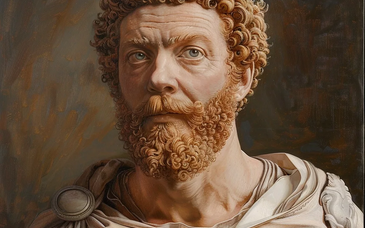Lectures
- The Geography of Italy
- The Etruscans
- The Roman Republic
- Roman Expansion and the Punic Wars
- The Civil War
- The Rise of Julius Casear
Instructional Goal: Students will know the cause and effects of the Roman Civil War.
I. The rapid growth of the Roman colonial holding created many internal problems.
- The republic, although democratic, did not extend citizenship to its colonies.
- The Organization of the colonies promoted inefficiency and corruptness; (A) The colonies were divided into "Provinces"; (B) Each province was governed by a "Proconsul" who was appointed for one year with no salary; (C) This practice led to corruptness; (D) Proconuls turned tax-collecting over to "Publicans" who got to keep all excess taxes collected; (E) This process of "Tax-farming" placed a huge financial burden on the colonial peoples.
- The colonial lands, although state-owned, were ruled as private estates (Latifundias) by aristocratic patricians.
- A large commerical trade soon developed with the colonies which led to a new middle class (Equites) which had wealth but no political power.Political dissent began to rise when an increase of jobless citizens occured as a result of increase in slaves and decline of the small farmer who could not compete against the large latifundias.
II. The Equites were led by two very charismatic brothers who are sometimes compared to the Kennedy' of the 1960's.
- Tiberus Gracchus (163-133 BC), although a member of one of the wealthiest and most powerful families of Rome, became a leader of the Equites; (A) He was the grandson of Scipio Africanus and is sometimes compared to FDR as the Roman "New Dealer"; (B) He became an emeny of the Patricians when he proposed land reform with a goal of complete resdistribution of all colonial lands into equal shares for all citizens; (C) He was elected Tribune in 135 BC and eventually was assassinated by a group of citizens goaded by the Senators in 133 BC.
- He was succeeded by his younger brother Gaius Gracchus (153-121 BC) who was also struck by the plight of the poor and unfranchised; (A) He announced his intention to not only continue his brother's land reform but also to subsidize food for the poor; (B) He was forced to kill himself when threatened with assassination.
III. The followers of the Gracchi brothers and the Senate begin to polarize into the first political parties.
- The "Populares", made up of Gracchi supporters, were liberals who believed in land reform and redistribution of political power.
- The "Optimates", made up primarily of aristocratic followers of the Senate, were conservatives who believed in maintaining the status quo.
IV. A Civil War (88-78 BC) broke out when control of the Roman government was challenged.
- Marius (157-86 BC) assumed power over the Populares. He was a Roman hero who had defeated an early Germanic invasion of Cisalpine Gaul in 105 BC and who is most remembered as the founder of the modern Roman army. He revolutionized the army by making it more mobile and better armed. He also opened up its ranks to non-citizens, the result of which led to an army loyal to its leader, not the state.
- Sulla (138-78 BC), an Optimate, became a consul of Rome in 88 BC. He was forced to leave Rome, however in the same year to put down a rebellion in Asia Minor (The Mithradatic War).
- With Sulla absent, Marius and a group of equites led by Cinna, seized control of the Roman government, executing many optimate leaders and abolishing the Senate in a reign of terror.
- Sulla was forced to return and he soon regained control in 83 BC.
- Upon his return he executes Cinna and completely crushes the Populare party, killing thousands of its followers.
- Sulla also restores the Senate and gives it absolute control over the Roman government.
- Many historians feel it is at this point that the Roman Republic ends and the Roman Empire begins.
- Marius, who had fled Rome, dies of natural causes while Sulla, at the height of his power, resigns and retires. He soon dies of natural causes in 79 BC.
Assignment: Read the "Slave revolt of Spartacus" by Appian.





